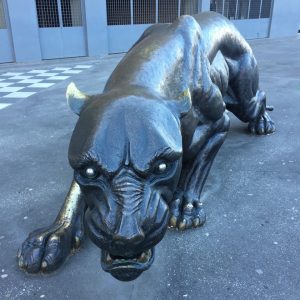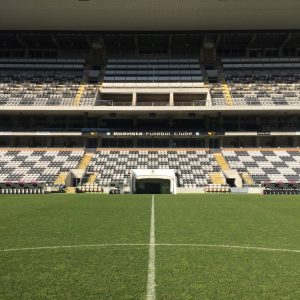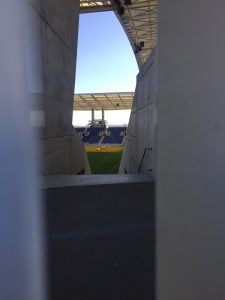With the stone cut for the sculpture – it will now slowly make its way back to the UK when we’ll begin etching the original Cambridge Rules in many languages – our final day in Portugal gave us the opportunity to look more closely at what football means to its people. Here’s our last twitter-based tale of the day.
If you’re in northern Portugal exploring at the history of football, you have to start at Boavista Futebol Clube. This is one of the oldest clubs in the country, one of only two teams other than the big three of Sporting, Benfica and the city they call home, Porto, to win the Primeira Liga.
And, given that they were founded by an English factory owner and his Portuguese textile workers, it felt somehow apt that our project, based on the way football spread from a small corner of an open space in Cambridge to the world, should pay a visit.
Today we are at @boavistaoficial to find out about early Portuguese football pic.twitter.com/lhWcsd0AXE
— Cambridge Rules 1848 (@Parkers1848) January 18, 2017
 We were really grateful that Boavista actually opened their museum especially for us. The trophy cabinet is quite something – they’ve won the Primeira Liga once (2000-1) and the Portuguese Cup five times. The chequered black and white of their shirts is everywhere – naturally they’re often referred to as Os Axadrezados (The Chequered Ones). We didn’t actually tweet all the pictures we took, but as you can see they take the black and white and their other, slightly more fearsome nickname, As Panteras (The Panthers), very seriously.
We were really grateful that Boavista actually opened their museum especially for us. The trophy cabinet is quite something – they’ve won the Primeira Liga once (2000-1) and the Portuguese Cup five times. The chequered black and white of their shirts is everywhere – naturally they’re often referred to as Os Axadrezados (The Chequered Ones). We didn’t actually tweet all the pictures we took, but as you can see they take the black and white and their other, slightly more fearsome nickname, As Panteras (The Panthers), very seriously.
In 1903 @boavistaoficial was founded by an English factory owner and his Portuguese textile workers – the museum was specially opened for us pic.twitter.com/bfLrpdMvLW
— Cambridge Rules 1848 (@Parkers1848) January 18, 2017
 They even took us on the pitch – the Estadio Do Bessa is a fantastic 28,000 capacity ground. We can’t resist showing you the steep sided, cauldron-like stadium. It seemed calm on a Wednesday morning, but when rivals Porto come to visit it must be a magic atmosphere.
They even took us on the pitch – the Estadio Do Bessa is a fantastic 28,000 capacity ground. We can’t resist showing you the steep sided, cauldron-like stadium. It seemed calm on a Wednesday morning, but when rivals Porto come to visit it must be a magic atmosphere.
The centre spot @boavistaoficial – fantastic tight cauldron of a stadium pic.twitter.com/NkbK7TkYZM
— Cambridge Rules 1848 (@Parkers1848) January 18, 2017
All of this was possible thanks to Rodolfo Silva, the stadium manager. He’s posted elsewhere on the site – he used to play in some of the age groups for Boavista. And they’ve always had a good youth policy, bringing through the likes of striker Nuno Gomes – who would go on to a fine international career and play for Fiorentina, Benfica and Blackburn Rovers.
Rodolfo Silva is the stadium manager – he played in the age groups for @boavistaoficial – he was a no. 10 and an age group champion pic.twitter.com/aHLni6ae7O
— Cambridge Rules 1848 (@Parkers1848) January 18, 2017
 So that was Boavista – and we were really touched with the gift of some scarves – but for the sake of city balance, we did have a quick squizz at FC Porto’s dramatic Estadio do Dragao on the way back to the airport. We loved the stickering away fans had done at the stadium, and as dedicated football ground archaelogists, the remnants of the old stadium still visible were intriguing.
So that was Boavista – and we were really touched with the gift of some scarves – but for the sake of city balance, we did have a quick squizz at FC Porto’s dramatic Estadio do Dragao on the way back to the airport. We loved the stickering away fans had done at the stadium, and as dedicated football ground archaelogists, the remnants of the old stadium still visible were intriguing.
We hope you’ve enjoyed reading about our trip to Portugal, which reminded us once again how embedded football is in culture and society. The stone, too, looked fantastic. Next week, Alan and Neville will write more in depth pieces about their experiences. For now, though, até mais!
From Portugal to Cambridge for meetings tomorrow pic.twitter.com/bY3cYXEwLp
— Cambridge Rules 1848 (@Parkers1848) January 18, 2017
